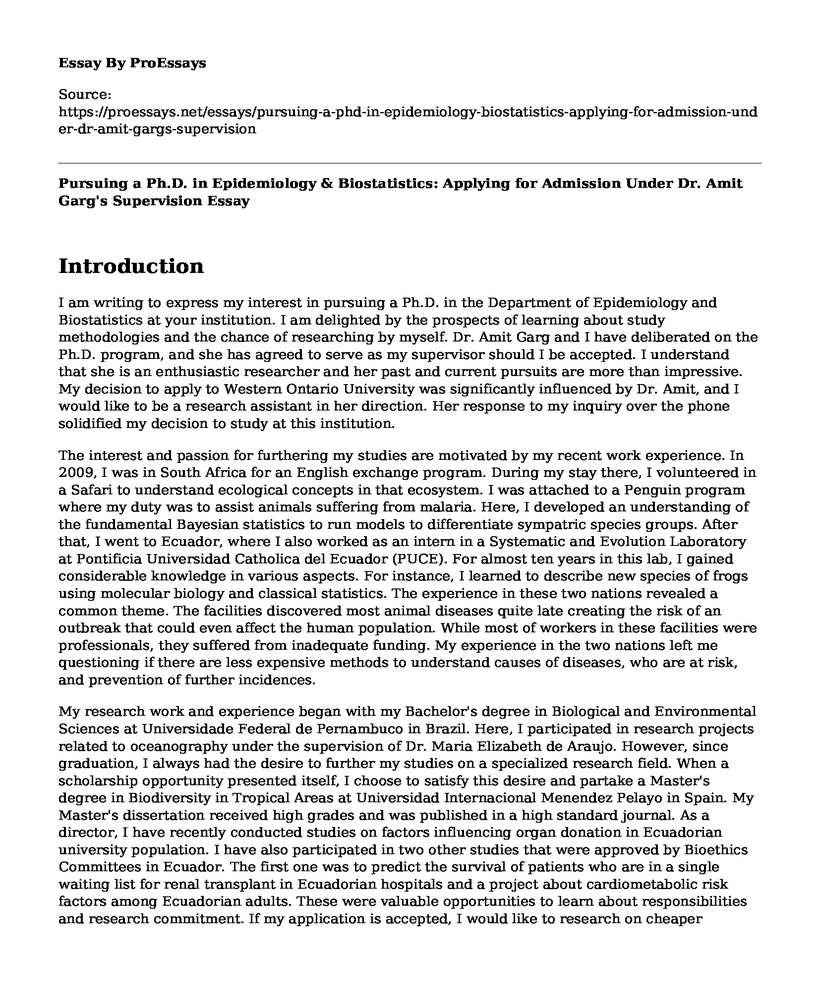Introduction
I am writing to express my interest in pursuing a Ph.D. in the Department of Epidemiology and Biostatistics at your institution. I am delighted by the prospects of learning about study methodologies and the chance of researching by myself. Dr. Amit Garg and I have deliberated on the Ph.D. program, and she has agreed to serve as my supervisor should I be accepted. I understand that she is an enthusiastic researcher and her past and current pursuits are more than impressive. My decision to apply to Western Ontario University was significantly influenced by Dr. Amit, and I would like to be a research assistant in her direction. Her response to my inquiry over the phone solidified my decision to study at this institution.
The interest and passion for furthering my studies are motivated by my recent work experience. In 2009, I was in South Africa for an English exchange program. During my stay there, I volunteered in a Safari to understand ecological concepts in that ecosystem. I was attached to a Penguin program where my duty was to assist animals suffering from malaria. Here, I developed an understanding of the fundamental Bayesian statistics to run models to differentiate sympatric species groups. After that, I went to Ecuador, where I also worked as an intern in a Systematic and Evolution Laboratory at Pontificia Universidad Catholica del Ecuador (PUCE). For almost ten years in this lab, I gained considerable knowledge in various aspects. For instance, I learned to describe new species of frogs using molecular biology and classical statistics. The experience in these two nations revealed a common theme. The facilities discovered most animal diseases quite late creating the risk of an outbreak that could even affect the human population. While most of workers in these facilities were professionals, they suffered from inadequate funding. My experience in the two nations left me questioning if there are less expensive methods to understand causes of diseases, who are at risk, and prevention of further incidences.
My research work and experience began with my Bachelor's degree in Biological and Environmental Sciences at Universidade Federal de Pernambuco in Brazil. Here, I participated in research projects related to oceanography under the supervision of Dr. Maria Elizabeth de Araujo. However, since graduation, I always had the desire to further my studies on a specialized research field. When a scholarship opportunity presented itself, I choose to satisfy this desire and partake a Master's degree in Biodiversity in Tropical Areas at Universidad Internacional Menendez Pelayo in Spain. My Master's dissertation received high grades and was published in a high standard journal. As a director, I have recently conducted studies on factors influencing organ donation in Ecuadorian university population. I have also participated in two other studies that were approved by Bioethics Committees in Ecuador. The first one was to predict the survival of patients who are in a single waiting list for renal transplant in Ecuadorian hospitals and a project about cardiometabolic risk factors among Ecuadorian adults. These were valuable opportunities to learn about responsibilities and research commitment. If my application is accepted, I would like to research on cheaper methods of detection and prevention of diseases. Besides, I am interested in the epidemiology, outcome, and prevention of HIV and associated illness. All my research will seek to address health issues affecting third and second world nations.
I currently work as a fulltime lecturer at Nursing Faculty of PUCE teaching research methods and biostatistics. I am a member of Research Committee and the Coordinator of Degree Qualification in Human Nutrition career at this faculty. My other responsibilities include methodological reading of undergraduate theses. I have published some articles related to biology field. I also taught and participated in some courses and workshops related to observational scientific research and biostatistics for teachers and students in the health sector. Although I have been involved in several studies, I do not feel that I can direct studies or serve on large scale research like the ones funded by NSF. I want to earn a Ph.D. because I would like to direct research at higher levels and receive grant opportunities. I know I can gain skills and benefit personally from the increased experience and depth of knowledge in the process of pursuing a Ph.D. After graduation, I would like to continue working in the education space as a professor or continue in high level research position.
Conclusion
I look forward to earning my Ph.D. in Epidemiology and Biostatistics at this university. I will prove immensely fruitful and facilitate my development as an individual researcher in my field. I feel that this institution has a lot to offer and I am confident that it is possible to make a positive contribution to ongoing research work at the department. Having decided to continue the engagement in this pursuit of a career in research, I am fully aware of the implications, which are dedication, resilience, and commitment. Thank you for your consideration.
Cite this page
Pursuing a Ph.D. in Epidemiology & Biostatistics: Applying for Admission Under Dr. Amit Garg's Supervision. (2023, Feb 12). Retrieved from https://proessays.net/essays/pursuing-a-phd-in-epidemiology-biostatistics-applying-for-admission-under-dr-amit-gargs-supervision
If you are the original author of this essay and no longer wish to have it published on the ProEssays website, please click below to request its removal:
- Measures Taken to Support People With Dementia Essay
- Overview Nursing Ethical Practice Paper Example
- STD at an Alarming Rate of Adults Paper Example
- Paper Example on Attracting, Retaining, & Training Nurses in Rural Areas: An Evaluation
- Smoking Habits in Mentally Ill and Veteran Populations - Essay Sample
- Abortion: A Controversial Issue Open to Debate and Discussion - Essay Sample
- Essay Example: Online Learning and Online Safety







